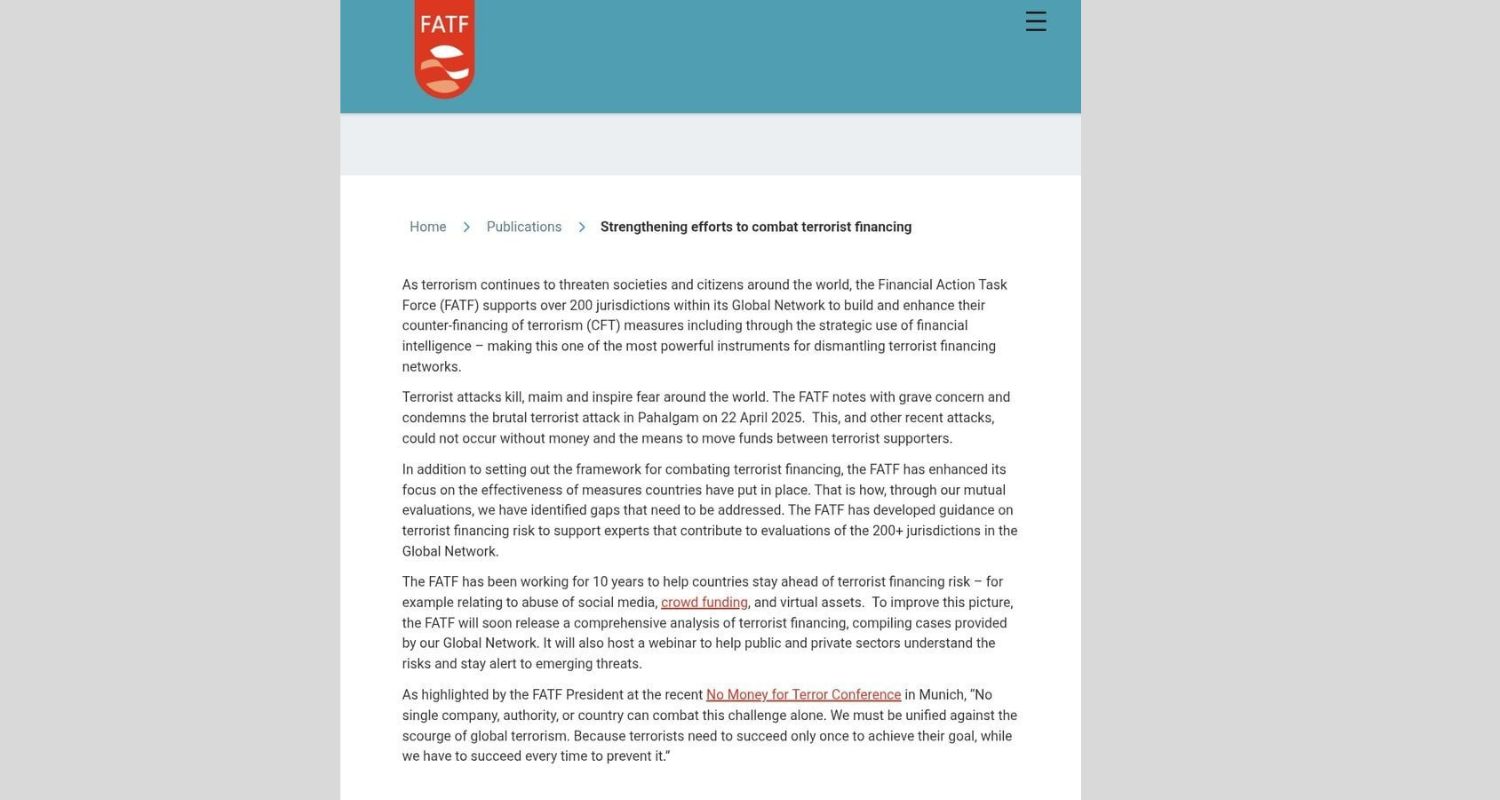The Financial Action Task Force (FATF) has strongly condemned the April 22 terror attack in Pahalgam, Jammu and Kashmir, which claimed the lives of 26 civilians, most of them tourists. In a significant statement, the global terror financing watchdog asserted that such an attack could not have occurred without financial support and the ability to transfer funds across established terror networks.
The Paris-based FATF, which had removed Pakistan from its grey list in 2022, stated that the movement of money lies at the heart of global terrorism. Referring specifically to the Pahalgam attack, FATF emphasized that financial flows were essential to orchestrating such violence. The mention of this specific attack is rare for the body and lends considerable international weight to India’s long-standing claim that Pakistan-backed terror outfits are responsible for cross-border attacks on Indian soil.
FATF’s condemnation comes as a boost to India’s efforts to bring Pakistan back under scrutiny for failing to dismantle terror networks operating from its territory. New Delhi has consistently provided evidence to FATF highlighting the role of hawala channels, NGOs, and increasingly, digital tools such as cryptocurrencies used by terror groups across the border.

While FATF has so far refrained from directly naming Pakistan in relation to the Pahalgam attack, its statement indirectly underscores the existence of Pakistan-based financing routes for terrorism. Analysts suggest that this condemnation could help India push for Pakistan’s re-inclusion in the grey list, especially as Islamabad faces accusations of not fulfilling the anti-terrorism commitments that led to its removal from the list in 2022.
Also Read: PM Modi says Kashmir to Kanyakumari rail link now reality
In its latest communication, FATF also flagged new and emerging risks in the fight against terrorism, including the misuse of social media platforms, crowdfunding efforts, and virtual assets. These tools, it noted, are increasingly being used to bypass traditional regulatory and surveillance mechanisms. A comprehensive report on global terror financing patterns is expected to be released by FATF in the coming weeks, alongside a webinar aimed at sensitising public and private sector stakeholders about the evolving threats.
Despite the clear condemnation of the Pahalgam attack, many in India remain concerned about the lack of direct action against Pakistan. While India's effort to highlight the threat of cross-border terrorism has gained some traction, the likelihood of Pakistan being relisted in the grey list remains uncertain, especially given shifting global diplomatic dynamics, including the changed US position under Donald Trump’s administration.
Pakistan, which was on the FATF grey list from 2018 until 2022, has repeatedly denied involvement in the Pahalgam attack and has called for an impartial international investigation. However, several Pakistani leaders have openly acknowledged that certain proscribed terrorist groups have continued to operate within the country. Defence Minister Khawaja Asif was quoted by international media as admitting that while Pakistan has taken some action, several of these groups are “independently operating in the region” beyond the government's full control.
India, meanwhile, continues to urge the global watchdog to take stronger action against Islamabad, arguing that Pakistan has failed to fully implement the necessary anti-terrorism laws required for a clean exit from the grey list. FATF President Elisa de Anda Madrazo, in a recent address, stressed the importance of international unity in countering terrorism. She remarked, “Terrorists need only one success, while nations must prevent every single attempt.”
With the FATF’s direct acknowledgment of the Pahalgam attack and its emphasis on terror financing, India is expected to intensify its diplomatic efforts to ensure that countries which shelter or finance terrorism are held accountable.
Also Read: Pahalgam attack targeted 'insaniyat & Kashmiriyat': PM Modi


